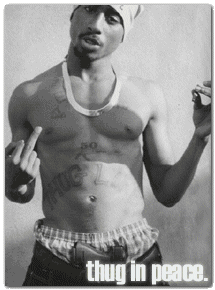2pac
Suspicious Facts
Biography
Picture Gallery
Poems
Outlaw Immortalz
Rare Facts
Movies
New York Shooting
Albums
2pacs Enemies
Bad Boy Info
Death Row Records
Non 2pac
Suge Interview
Black Panthers
LL COOL J
Wu Tang Clan
The Notorious B.I.G
N.W.A and Dr Dre
Usher
HOME
|
|

2pac - Raised as a panther
Panthers
Many people don't know about 2pac's
mother Afeni being a member of the Black Panther Party. Afeni was one of the
famous New York 21 who were falsely imprisoned in 1970 for 9 months. All the
prisoners were released in May of 1971 after being acquitted of all charges
brought against them by the NYPD.
The Party
New York Panther 21
The case of the Panther 21 serves as a classic example of police
infiltration and political repression which created a new generation of
political prisoners in the United States. For many membership in the Black
Panther Party proved to be a serious liability that resulted in assassinations,
frame-ups, long-term incarceration.
Unlike Mark Rudd, Jerry Rubin and other white "radicals" who were able
to re-integrate into the mainstream, the lives of former Black Panther Party
leaders were, more often than not, irrevocably shattered. Their lives will bear
the scars of the brutal and violent repression they endured forever. Many
believe that the indictment
of the Panther 21 was a racist and politically motivated frame-up by the
government, through its Counter-Intelligence Program, to destroy the Black
Panther Party and the Black Liberation
movement.
The Black Panther Party was a grassroots organization of young
Black men and women dedicated to the empowerment of Black people. While the
Black Panthers advocated self-defense they never supported unprovoked, random,
indiscriminate violence - The right to self defense was but one of the ten
points of its
political platform. Contrary to the racist image painted by the mainstream
media, the BPP was not a bunch of gun-toting thugs, blood-thirsty fanatics -
Leaders of the Black Panther Party were targeted by the
COINTELPRO for what the FBI termed "neutralization" (a code word for
assassinations, frame-ups, imprisonments and public
vilification) in early 1969. Federal and local law enforcement agencies
successfully assassinated many Black Panthers (Fred Hampton, Mark Clark, Zayd
Shakur) or successfully imprisoned them for life (Geronimo ji jaga pratt, Mumia
Abu-Jamal, Marshall Eddie Conway, etc.) by utilizing extra-legal means (e.g.
suborning
of perjury, harassing and intimidating witnesses, withholding of exculpatory
evidence, etc.)
In the late 1960s, as the U.S. "civil rights" movement
grew and became more militant in its opposition to racist and poor domestic and
foreign policies, the FBI intensified its domestic surveillance and
counter-insurgency programs aimed at the Black community. The BPP became the
primary target of the FBI's Counter
Intelligence Program (COINTELPRO). The 1974 findings of the Church Committee (a
Senate Committee on Government Operations) revealed that almost 90% of the FBI's
counterintelligence activities that were aimed at the Black community targeted
the BPP. The US government's Counter- Intelligence Program (COINTELPRO)
effectively destroyed radical. Black political dissent in the US by murdering,
framing, incarcerating its leaders or forcing them into exile.
The United States denies the existence of political prisoners
within its borders - Instead, the US law enforcement agencies classifies these
former political activists that it targeted as mere criminals.
Within the US, the criminal justice system (law enforcement, the courts, jails
and prisons) is used to repress political activists -
Illegal methods were used to frame political prisoners - A review of these cases
reveal gross patterns of prosecutorial misconduct which includes: the
fabrication or concealment of evidence by the government during trial.
Statistics prove that political prisoners consistently receive longer prison
terms than do right-wing fanatics
or non-political offenders. They are also forced to endure the harshest
conditions of confinement. The majority of political prisoners in the US today
are Black and former members of the Black Panther Party.
|
